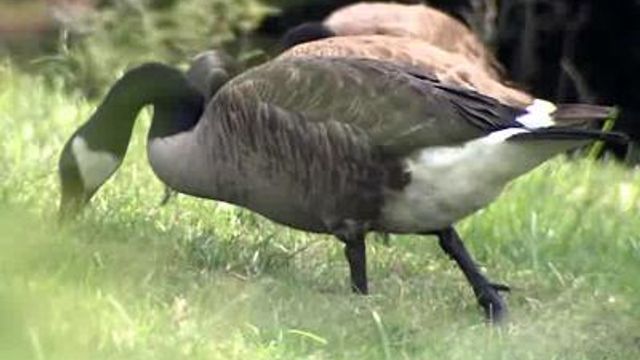Geese removed from Durham neighborhood
Sanitation and safety concerns prompted a Durham housing association to ask the federal government to remove wild geese from a neighborhood lake the birds made a home.
Posted — UpdatedThe U.S. Department of Agriculture on Tuesday euthanized 20 of the approximately 100 animals in the Woodlake subdivision in southwest Durham after residents complained their neighborhood had become overpopulated.
The Canada geese were a nuisance, residents say, leaving feces in yards, walking trails, lakes and other public areas, including the neighborhood pool.
According to the USDA, a goose can produce up to a half-pound of waste a day.
In some instances, the territorial animals have also become violent, charging at children and pets.
"I knew they were here, but they have multiplied so much that I think that's the problem," said Charlotte Maynor, a 16-year resident of the Woodlake neighborhood.
Because the geese are protected under the Federal Migratory Bird Act, the Woodlake Housing Association had to get a permit from the USDA to have the birds euthanized.
John Stone, president of Community Association Services, which manages the Woodlake Homeowners Association, says the goal is not to eliminate the geese entirely but to control the population.
"Health and safety issues were foremost in the board's decision," he said in a statement. "Please understand that this program addresses overpopulation, not elimination."
Still, some people who live in the area are upset that the geese were killed.
"I refuse to believe that all of these people know that their complaint got these animals killed," said Denise Reaves, who walks her dog around the neighborhood lake every morning. "I feel like if at least a third of them are upset about it, then maybe it won't happen again."
Contacting the USDA was a last resort.
The neighborhood previously tried to plant tall grass around the lake to block the geese from entering yards.
It also urged residents not to feed the animals, since feeding them can encourage them to stay around.
Another action was treating geese eggs in the spring to keep them from hatching.
The USDA says that as of 2006, there were 97,000 Canada geese in the state.
The population has increased exponentially over the past 40 years. In 1970, there were approximately 250,000 resident Canada geese in the U.S. By 2010, that number jumped to 3.5 million.
• Credits
Copyright 2024 by Capitol Broadcasting Company. All rights reserved. This material may not be published, broadcast, rewritten or redistributed.




